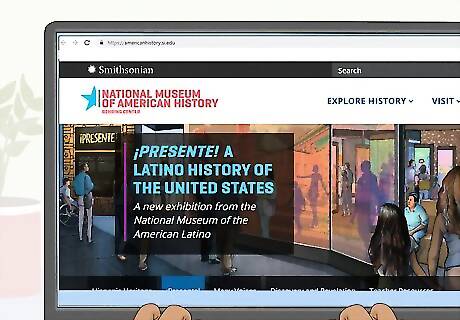
views
- Be tolerant of other viewpoints. Tolerance is a key feature of the American identity that dates back to the constitution.
- Defend the right to the freedom of speech.
- Educate yourself on America's history, government, and current challenges.
Understand what makes a "good" American.

Americans are equally committed to diversity and unity. Americans fill both sides of the aisle; they’re different races, genders, sexual identities, and religions. So what do all “good” Americans have in common? They support their neighbors, they’re generous in spirit and in attitude, they’re tolerant of different opinions, and they work hard to continue improving a country they love. The American Constitution says we should aim, “To form a more perfect Union.” Meaning, we should work to improve every individual’s life within the American collective.
Take pride in America's freedom of speech.

Unlike some other countries, America protects free speech. To honor your country, exercise your own free speech, and protect your neighbor’s rights when you have the opportunity. Under the first constitutional amendment, the government can’t limit religion, press, assembly, and petitions that fall under “free speech.” To exercise your freedom of speech, you don’t have to hit any age or citizenship requirement. If you’re on US soil, you’re in the clear. To you, freedom of speech may be praying on public school grounds—no one can keep you from expressing your beliefs (as long as they aren’t disruptive). Or, your neighbor may chose to protest an American law that they find unjust. If others disapprove, vocally support their freedom of speech.
Value your American identity.

Americans value being part of a collective. To be a good American, buy into a common identity. Your country is made up of totally different individuals, but at the end of the day, you share common goals and characteristics. You’re all committed to creating a safe, prosperous place to live for all American people. You’re dedicated to free speech, including voting rights, for all. American plurality also means that as the country’s collective identity changes, the laws that support and define it should change in fitting ways.
Stay true to red, white, and blue.

Be a loyal American. Balance love for your country with a tolerance for dissent—meaning, while you uphold and celebrate American values, remember that accepting your neighbor’s differing opinions is an important American ideal, too. If you’re new to the country, pledge your loyalty and fidelity as a part of your citizenship oath. If you’re a dual citizen, continue loving your original nationality, but prioritize your American identity. Do your best to respect your country even while you're protesting for change—for example, don’t burn the flag to make a point. Support US teams abroad. Sports, for instance, symbolize country pride. Cheer on Team USA’s athletes in the Olympics to show your love.
Keep your country beautiful.

Make it your mission to preserve American arts and nature. How can you show love for your country? Protect and support its natural beauty—both its physical landscape and its rich culture. Volunteer your time and money to keep America green and gorgeous. Clean up local beaches and highways; plant trees and dedicate time to environmental restoration practices. Support your local arts by attending theaters, shows, and plays. Donate to orgs that keep arts in schools, too. Do your best not to damage the American landscape. Never litter (especially in natural parks), and recycle when you're able.
Abide by American laws.

Respect laws that keep us safe (and help change laws when necessary). In any civilized community, order is important—in America, police officers keep order. Do your best to abide by local and federal laws, carry your license with you, and listen to officers when you interact. At the same time, no criminal justice system is perfect, and it’s important to use your voice to improve the American system when that’s needed. Times change and a country’s needs will, too—the only way to guarantee an imperfect justice system is to refuse to let it grow, adjust, and improve. If you feel like the American policing system needs work, use your freedom of speech to organize, petition, and protest until change occurs.
Be polite.

On the whole, Americans are friendly, personable, and neighborly. Greet a stranger on the street, and it’s very likely that they’ll respond in a kind, enthusiastic way. Have small talk with acquaintances, smile in your greetings, and use phrases that show good manners (like “Please,” “Thank you,” and “I’m sorry”). Try asking questions that show people you have an interest in their life: “How has your dog been? I remember he’d been sick recently.” Shake hands with new acquaintances and look them in the eyes while you speak to each other. Hold the door and elevator for others when they approach you. This is a simple way to show that you’re looking out for them.
Prioritize tolerance.

Even if you disagree, understand that other opinions are worth protecting. Being tolerant is an American virtue—to do this, try looking for common ground and seek to understand others' takes, not just disprove them. Ask questions and listen carefully. If you feel hurt by another's opinion, remember that understanding creates room for them to form new thoughts, feelings, and beliefs—hostility usually does the opposite. When someone says something you disagree with, try to understand: “Okay, interesting. Why do you think it is that you feel that way?” When you disagree, dismantle arguments, don’t insult others personally. “Hmm…I disagree with your take, because studies show the opposite…” “Tolerance” can help create a strong foundation. With a strong foundation, Americans can create a safer, happier, more moral country going forward.
Practice compassion and charity.

Love your neighbors and the less fortunate to honor your country. Being a great American means recognizing that we’re all in this together; so in a way, your neighbor’s struggles are yours, too. Give money to the less fortunate, perform random generous acts, and most of all, try to understand people who have less than you—instead of judging them. Donate your time and resources to organizations. Research local and national charities, carve out time to commit, and work to improve the lives of others. Bring cookies to your struggling neighbor, bring lunch to a homeless person on your street, or buy holiday gifts for a family in need in your community. Do research to understand why hunger and homelessness occur in your community. This will make you a more compassionate and better American overall!
Stay optimistic.

Americans believe in a brighter future. Their energy and confidence can be an amazing tool; this helps Americans to build better communities, work harder for others, and dream of a new and exciting future. To honor your country, keep thinking of ways you improve your community and even when things seem hopeless, refuse to give up. For instance, if your local football team is having a losing season, continue cheering them on! Plan ways to support them more during their next season, too. If you’re an environmentalist, you may feel that negatives are everywhere. Don’t let this stop you—continue searching for positive, fresh ways to fight the good fight.
Focus on your health.

Americans value physical and mental fitness. So, honor your country by treating your body right. Focus on getting all of the nutrients you need, work out in ways you enjoy, and make time to decompress from your busy schedule. After all, your body and emotions are linked, so you can’t ignore mental and emotional health when you’re looking to get fit! Try exercises that get you into nature (which is another natural stress reliever). Canoe, jog, hike, row, swim, or bike around your community. If you’re looking to eat healthier but have trouble with healthy diets, try smoothies. Knock out your daily fruit and veg intake in one, blended drink. Pay attention to what makes you feel good. Spend time with friends, get creative, or even book time with a therapist if it helps you relax.
Study American history.

By understanding your country's history, you'll know better how to honor it. When was America founded, and how did it come to be? What about indigenous Americans—what do you know of their history on their land? To be a good American, study the lives that built your country. Learn about conflicts, themes, and turning points that shaped America over centuries. Try these tips to learn more: Enroll in a course at your local community college on US History to get the basics down. Study facets of US history that interest you. Read classic American fiction, nonfiction, and online sources, like the American History Museum. Stay on top of current events by reading the newspaper and listening to podcasts. The New York Times’ podcast (The Daily) is a great place to start.
Read up on the American government.

Pay special attention to the political institutions that serve you. Voting, the government’s branches (executive, judicial, and legislative), the constitution and its amendments are all key topics. While you're studying, try to understand these important themes, too: Separation of powers: The American government aims to divide governing powers across different branches, so that no one branch becomes too powerful. Checks and balances: This relates to the separation of powers—every branch has the power to police or “check” every other branch. Federal versus state: Federal government is the central system that enforces laws across the country—then, some laws are set at a state level.




















Comments
0 comment